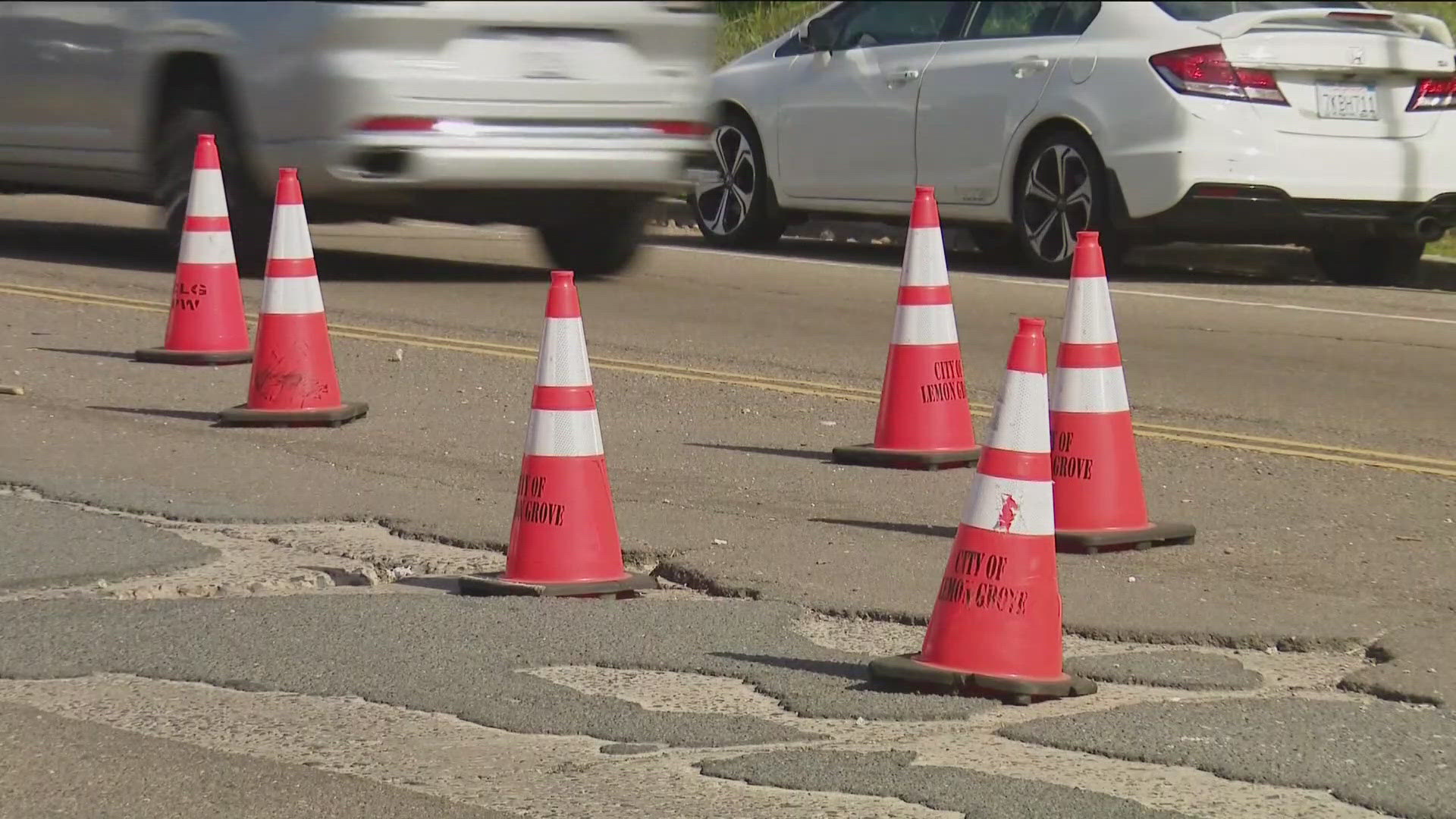SAN DIEGO — A newly released audit review shows even simple fixes could result in major improvements to San Diego's pothole-ridden streets.
Those relatively simple fixes include; new mapping software to allow crews to group pothole assignments in specific areas, a new patch truck to avoid having crews wait for repairs on older trucks and requiring managers to monitor pothole repairs to ensure progress.
San Diego City Auditor Andy Hanau and his staff said that grouping pothole repairs alone could result in crews responding to 27 percent more potholes compared to the current model and result in a 40 percent reduction in miles driven.
Since 2013, the city has assigned a single pothole truck and crew to each of the nine council districts. However, council districts stretch for several square miles. Currently, crews fill one pothole and then travel to the other side of the district to repair another as opposed to filling potholes in the immediate area they are working in.
The city auditor found that by using basic mapping, which the city's current software is capable of performing, crews can fill 27 percent more potholes in a single day.
"Picking the most efficient route resulted in doing about 27 percent more potholes per day," said City Auditor Andy Hanau. "Right now, crews are assigned 10 pothole repairs per day. By using mapping they can repair upwards of 14. Multiply that by nine crews a day times 200 work days a year you're getting 1000s more potholes done for the same amount of money."
Use the red button to compare the current process to the one suggested by the city auditor:
Aside from buying and implementing new mapping software, the audit found that investing in even one new truck would help get crews to work.
"Our re-review also found that Transportation does not have enough patch trucks because they are frequently out for maintenance," reads the April 2024 review. "We found that four out of nine patch trucks were each out of service for repairs for more than 20 percent of 15 months."
A workaround to maintain the old trucks is simple, said City Auditor Andy Hanau; buy a new truck.
"When trucks are unavailable, all nine crews cannot be deployed to repair potholes, reducing the number of potholes that can be repaired with the program’s $3.95 million budget. The addition of a backup patch truck for a one-time cost of about $174,000 would substantially increase the number of potholes repaired and decrease the average cost to repair a pothole."
In addition, the city auditor's review of the department said that managers in the Transportation Department are not monitoring even the basic metrics, and doing so could result in more efficiency for city crews.
City Auditor Hanau says the mayor and staff will make the final decision on when or if the recommendations will be implemented.
"The mayor and council have a lot of tough budget decisions to make this year," said Hanau. "But we recommend transportation highlight the return on investment that could be gained through things like an additional pothole repair truck, and additional mapping software if they need it because it looks like perhaps their existing system does have that capability. And they might be able to do that at no additional cost."
The city auditor's review arrives as the condition of San Diego's streets continues to degrade.
A new city survey released in early January downgraded San Diego's overall "pavement rating" from satisfactory to fair.
According to the city's pavement condition index, city road teams designated 594 street segments as "failing" or by the city's definition streets that are "extremely distressed and require full reconstruction."
Of the 594 failing roads, only 79 have the funding needed for repairs over the next five years.
CBS 8 reached out to the city for comment on the auditor's review and told CBS 8 that the city will implement the recommendations given that funding is available. A spokesperson for the city told CBS 8:
"The Transportation Department’s pothole teams have built significant efficiencies into our operations since the last audit in 2013. The current city-wide count of potholes received through Get it Done is at 111, and our teams filled an all time high of over 10,000 potholes in one month during February 2024, during one of the wettest winters on record. The Transportation Department continues to implement efficiencies into our operations and has agreed to recommendations of the City Auditor to implement mapping software and add more patch trucks (both pending funding), enhance data management, establish performance measures and incorporate an equity lens for pothole operations. Most importantly, we also continue to improve our road conditions through the efficient and effective use of available resources including adding a third in-house mill and pave team in FY25 to rebuild and resurface streets that have historically had too many potholes reported."
Search for failing roads in your community:

